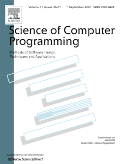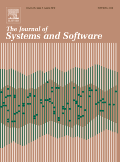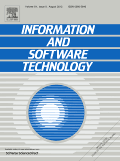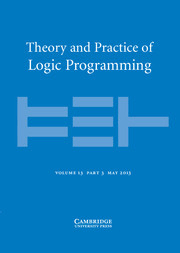
SCIENCE OF COMPUTER PROGRAMMING
Scope & Guideline
Transforming Ideas into Computational Excellence
Introduction
Aims and Scopes
- Formal Methods and Verification:
Research dedicated to the use of formal techniques for the verification and validation of software systems, ensuring reliability and correctness in critical applications. - Software Testing and Quality Assurance:
Exploration of methodologies and tools for software testing, including automated testing, fuzz testing, and model-based testing to enhance software quality. - Programming Languages and Paradigms:
Study of programming languages, their design, implementation, and the exploration of paradigms such as functional, object-oriented, and concurrent programming. - Software Development Methodologies:
Investigation into various methodologies for software development, including agile, model-driven development, and their implications for project management. - Artificial Intelligence and Machine Learning Applications:
Application of AI and machine learning techniques in software engineering, including defect prediction, automated code generation, and user experience enhancement. - Systems and Software Architectures:
Research into architectural styles and frameworks for developing complex software systems, including microservices, distributed systems, and cloud computing.
Trending and Emerging
- Machine Learning and AI in Software Engineering:
There is a growing trend towards integrating machine learning and AI techniques in software engineering practices, particularly in areas like code analysis, defect prediction, and automated testing. - Blockchain Technology and Smart Contracts:
Increasing research is being dedicated to blockchain technology, focusing on smart contract development, verification, and security, reflecting the technology's rising importance. - DevOps and Continuous Integration/Continuous Deployment (CI/CD):
The emphasis on DevOps practices and CI/CD pipelines is emerging as a central theme, highlighting the need for automated testing and deployment strategies in modern software development. - Cybersecurity in Software Development:
With rising concerns over software security, there is an increasing focus on methodologies and tools for ensuring the security of software applications throughout their lifecycle. - User Experience and Human-Centric Software Design:
Research is trending towards enhancing user experience through human-centric design approaches, reflecting a shift in focus from purely technical aspects to user satisfaction.
Declining or Waning
- Traditional Waterfall Methodologies:
Research interest in traditional waterfall methodologies has decreased as the industry shifts towards agile and iterative development models that better accommodate changing requirements. - Static Analysis Techniques:
While still relevant, there appears to be a reduced focus on traditional static analysis techniques, with a growing emphasis on dynamic analysis and runtime verification methods. - Legacy Systems Maintenance:
Research on the maintenance and modernization of legacy systems is becoming less prominent, possibly overshadowed by newer technologies and frameworks. - Manual Testing Approaches:
There is a noticeable decline in publications related to manual testing approaches as automated testing frameworks and methodologies gain traction. - Single-threaded Programming Models:
As multi-core and distributed computing become more prevalent, research on single-threaded programming models is waning, with less emphasis on their optimization.
Similar Journals

JOURNAL OF SYSTEMS AND SOFTWARE
Empowering Researchers with High-Impact Findings.JOURNAL OF SYSTEMS AND SOFTWARE, published by Elsevier Science Inc, is a premier academic journal that serves as a vital platform for the dissemination of cutting-edge research in the fields of software engineering, information systems, and hardware architecture. With an impressive impact factor and consistently ranking in the Q1 category across several relevant sectors, including hardware and architecture (ranked 33rd out of 177), information systems (ranked 72nd out of 394), and software (ranked 75th out of 407) as of 2023, this journal is recognized for its rigorous peer-review process and high-quality publications. Established in 1979, the journal has become an essential resource for researchers, professionals, and students looking to stay abreast of the latest advancements and emerging trends in systems and software. While the journal does not currently operate under an open-access model, it ensures wide visibility through its indexed publications and is dedicated to advancing scholarly discourse in computer science. With contributions from leading experts in the field, JOURNAL OF SYSTEMS AND SOFTWARE continues to shape the landscape of software and systems research.

Journal of Object Technology
Advancing the Frontiers of Object-Oriented InnovationJournal of Object Technology is a premier publication housed under the esteemed JOURNAL OBJECT TECHNOLOGY in Switzerland, dedicated to advancing the field of software engineering and technology. With a history of continuous publication since 2002, this journal serves as a platform for innovative research, critical reviews, and case studies that explore the nuances of object-oriented technologies and their applications in software development. Although currently categorized in the lower quartile (Q4), this journal's focus on relevant and emerging topics remains vital for researchers, professionals, and students alike, seeking to enhance their understanding of contemporary software-related issues. Addressing significant milestones and offering insights into future directions, the Journal of Object Technology plays an essential role in the evolving landscape of computer science, providing open access opportunities that ensure wide dissemination of knowledge. Situated at ETH Zurich, the journal is committed to fostering collaboration and dialogue among researchers worldwide, underscoring its importance within the global scholarly community.

Proceedings of the ACM on Programming Languages-PACMPL
Exploring Cutting-edge Research in Programming Languages.Proceedings of the ACM on Programming Languages (PACMPL) is a premier journal that focuses on the advancement and dissemination of knowledge in the field of programming languages. Published by the Association for Computing Machinery (ACM), this rigorous journal serves as a vital platform for researchers, professionals, and students alike, contributing significantly to software development and safety across diverse applications. With impressive rankings in Q1 quartiles for both Safety, Risk, Reliability and Quality and Software, and a recognition in the Scopus Rankings, PACMPL stands out as a critical resource for cutting-edge research. The journal is particularly relevant in today’s rapidly evolving technological landscape, focusing on innovative practices and methodologies in programming languages that enhance system reliability and performance. As an Open Access publication since its convergence in 2017, PACMPL not only emphasizes high-quality peer-reviewed research but also prioritizes accessibility, making significant contributions to the global knowledge base. By empowering researchers and practitioners with the latest findings and trends, PACMPL continues to firmly establish its importance in the computing field.

PROGRAMMING AND COMPUTER SOFTWARE
Elevating the Standards of Programming Knowledge Since 1978PROGRAMMING AND COMPUTER SOFTWARE is a distinguished journal committed to advancing the field of software development and programming methodologies. Published by PLEIADES PUBLISHING INC, this journal has been a valuable resource since its inception in 1978, reaching out to researchers, professionals, and students alike. With an emphasis on rigorous peer-reviewed articles, the journal holds a Q3 ranking in the realm of Software according to the latest 2023 Category Quartiles. Though it does not offer open access, the journal ensures that high-quality research is disseminated to its audience, providing insights into evolving programming techniques, software engineering challenges, and innovative solutions. With its convergence of years extending to 2024, PROGRAMMING AND COMPUTER SOFTWARE remains a pivotal publication, fostering a deeper understanding of the complexities in computer programming while supporting the broader software community.

Frontiers of Computer Science
Fostering Dialogue that Shapes the Future of TechnologyFrontiers of Computer Science is a leading peer-reviewed journal dedicated to advancing the field of computer science through the publication of high-quality research articles, reviews, and theoretical discussions. Published by HIGHER EDUCATION PRESS, this journal has gained significant recognition, currently boasting a prestigious impact factor and ranking in the Q1 quartile for both Computer Science (miscellaneous) and Theoretical Computer Science categories in 2023. With a focus on the intersection of computational theory and practical applications, it serves as a vital platform for researchers, professionals, and students alike who are eager to contribute to and stay updated with groundbreaking developments. The journal’s scope encompasses a wide range of topics, reflecting the diverse nature of computer science today. Operating from Beijing, China, it emphasizes Open Access, ensuring that vital research is readily available to the global academic community. With its convergence period spanning from 2013 to 2024, Frontiers of Computer Science remains committed to fostering innovation and scholarly dialogue that drives the future of technology.

INFORMATION AND SOFTWARE TECHNOLOGY
Elevating Research Standards in Information and Software TechnologyINFORMATION AND SOFTWARE TECHNOLOGY, published by Elsevier, is a leading journal that stands at the forefront of the fields of software engineering, information systems, and computer science applications. Since its inception in 1970 and with a focus extending to 2025, this esteemed publication has made significant contributions to the discourse on technological advancements and innovations. In 2023, it has achieved a remarkable Q1 categorization across multiple domains, including Computer Science Applications, Information Systems, and Software, reflecting its excellence and relevance in the academic community. With Scopus rankings that place it in the top percentiles in its categories (85th, 83rd, and 83rd respectively), the journal serves as an essential platform for researchers, professionals, and students eager to disseminate and engage with cutting-edge research and developments. While it does not currently offer Open Access options, the knowledge curated within its pages remains invaluable for advancing the fields of information technology and software development.

ACM TRANSACTIONS ON SOFTWARE ENGINEERING AND METHODOLOGY
Unveiling Cutting-Edge Insights in Software EngineeringACM Transactions on Software Engineering and Methodology, published by the Association for Computing Machinery, is a leading journal in the field of software engineering, featuring cutting-edge research and methodologies that influence practices and advancements in the discipline. Established in 1992, this journal boasts an impressive Q1 ranking in Software for the year 2023, signaling its high impact and relevance within the academic community. With its strong Scopus rank (#126/407) and a solid 69th percentile, it serves as a critical platform for scholars, practitioners, and students alike, promoting the dissemination of innovative ideas and solutions that drive the software industry forward. Although it operates without an open access option, it consistently publishes peer-reviewed articles, technological advancements, and case studies that shape the future of software engineering. The journal's commitment to quality and excellence makes it an essential read for anyone keen on understanding the complexities and methodologies transforming the field.

SOFTWARE QUALITY JOURNAL
Advancing excellence in software engineering.SOFTWARE QUALITY JOURNAL, published by Springer, is a preeminent platform dedicated to advancing the field of software engineering and quality assurance. With an ISSN of 0963-9314 and an E-ISSN of 1573-1367, this journal serves as a vital resource for academics and practitioners alike, bridging the gap between theoretical frameworks and practical applications. The journal is recognized for its impactful contributions, holding a remarkable Q1 ranking in Media Technology and demonstrating strong performance with Q2 placements in Safety, Risk, Reliability and Quality, as well as Software, solidifying its reputation in the academic community. As of 2023, the journal is ranked 64th in Safety, Risk, Reliability and Quality and 176th in Computer Science Software on Scopus, showcasing its relevance and influence. Covering a broad range of topics from software quality metrics to risk management strategies, SOFTWARE QUALITY JOURNAL aims to foster innovation and best practices in software development. Join a community of leading researchers and professionals committed to enhancing the quality and reliability of software systems.

JOURNAL OF AUTOMATED REASONING
Fostering Excellence in Automated Reasoning MethodologiesJOURNAL OF AUTOMATED REASONING is a premier academic journal published by SPRINGER, focusing on the dynamic and evolving fields of Artificial Intelligence, Computational Theory and Mathematics, and Software. With an ISSN of 0168-7433 and E-ISSN 1573-0670, this journal ranks impressively in the second quartile (Q2) across multiple categories, reflecting its significant contribution to the advancement of knowledge in automated reasoning methodologies. Since its inception in 1985, it has served as a vital platform for researchers and professionals to share groundbreaking findings and innovative techniques, facilitating the exploration of algorithms, logical frameworks, and reasoning processes that underpin artificial intelligence systems. Although it does not currently offer Open Access options, it remains a highly regarded resource, cited widely in academia, with its impactful publications reflecting deep insights and rigorous scholarly standards. The journal’s esteemed status and its ongoing commitment to fostering a greater understanding of automated reasoning make it an invaluable asset for those dedicated to pushing the boundaries of these interdisciplinary fields.

THEORY AND PRACTICE OF LOGIC PROGRAMMING
Advancing the Frontiers of Logic Programming.THEORY AND PRACTICE OF LOGIC PROGRAMMING, published by Cambridge University Press, is a premier academic journal that delves into the evolving field of logic programming, offering insights and advancements from 2001 to 2024. With an ISSN of 1471-0684 and an E-ISSN of 1475-3081, this journal serves as a vital resource for researchers, professionals, and students interested in areas such as artificial intelligence, computational theory, and software development. In 2023, the journal was recognized for its excellence, achieving Q1 status in Computational Theory and Mathematics and Q2 in several other categories, underscoring its significant impact within the academic community. Despite not being open access, its robust content, curated by esteemed scholars, guarantees high-quality research and innovative methodologies that are crucial for advancing the field. The journal's rigorous peer-review process and its standings in Scopus rankings further emphasize its relevance and authority, making it a quintessential platform for disseminating key findings and fostering scholarly dialogue.